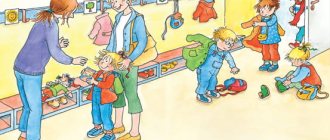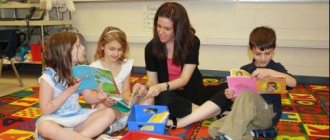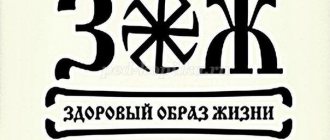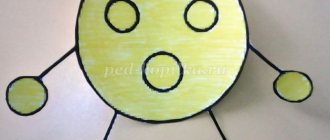Summary of a game lesson in the younger group of kindergarten. Journey to the land of Russian nursery rhymes
Game activity for children of primary preschool age “Journey to the wonderful land of Russian nursery rhymes.”
The methodological development is intended for educators working with children of primary preschool age (3-4 years).
Goal: Instilling a love for Russian folk art, emotional responsiveness to reading nursery rhymes. Objectives: Help remember nursery rhymes learned earlier, teach to read loudly, expressively, pronouncing words. Teach children to answer questions and form diminutive nouns. To develop the expressiveness of speech, contribute to the formation of a sound culture of speech, develop memory, and activate adjectives in children’s vocabulary that describe the external signs of animals. Develop communicative communication using folklore. To cultivate respect for the living, apt folk word, for the creativity of the Russian people. Arouse a feeling of sympathy for familiar characters, create a joyful mood from meeting them. Preliminary work: Reading nursery rhymes, memorizing them, playing out nursery rhymes, poems, excerpts from fairy tales, guessing riddles, looking at illustrations and paintings, replenishing vocabulary, activating it. Materials and equipment: Toys: cat, bear, squirrel, hare; hats - bunny masks. Methodical techniques: Artistic word.
Conversation. Show. Joint activities between the teacher and the children. Question answer. A game. Introduction of a literary character. Progress of the lesson:
Educator: In the old days, on long winter evenings or after a summer working day, when the gardens were dug up and plowed, people gathered for gatherings, where they spun, knitted, embroidered, and always sang their favorite songs, ditties, teases, jokes, jokes, told each other nursery rhymes. It was more fun to work this way, the evening passed faster and more unnoticed, and the work went smoothly. It has long been said: “Fun and work live side by side.” And I invite you to the wonderful land of Russian nursery rhymes. So, let's hit the road. The carriages and carriages rumble along the rails. They are taking a group of children to the country of Nursery rhymes. We go, we go, we go to distant lands, Cheerful guys and best friends.
Educator: Here we are at our first stop! Here the cat meets us. Hello, cat! You're kind of sad today. Educator: (Indirectly on behalf of the cat) “Hello, guys! I’ve been living with you for a long time and every day you talked about yourself, about your games, but you didn’t say anything about me, so I became sad.” Educator: Children, do you agree to help the cat? (children's answers) Educator: Let's sit down on the carpet with the cat and continue our conversation. How can we help the cat? (children's answers). Educator: That's right, we need to cheer up the cat so that he doesn't get sad. What can we do about this? Children's answers. Educator: We also know a Russian folk nursery rhyme about the cat. Let's tell it to the cat. Kitty, now we’ll give you a concert, the children will take turns reading you a nursery rhyme. But whoever will read will be chosen by the cat. Whoever he touches with his paw will read the nursery rhyme.
Reading a nursery rhyme. The cat was inflating the balloon, but the kitten was disturbing her. The top came up with a paw, and the cat’s ball popped. Educator: Look, guys, our cat is having fun. He liked the way you told the nursery rhyme. Look, what cat? Children: Beautiful, fluffy, kind, affectionate, gentle. Educator: He is very kind and affectionate, let's pet him. The cat is very friendly and wants every child in the group to pet him. (Children petting the cat). Educator: Guys, we all have names, and the cat also needs a nickname. Let's figure out together what we should call it. (Children offer their own options for nicknames). Educator: What interesting nicknames you come up with, it seems to me that the nickname Vasya is very suitable for our couch potato. Right, guys? (Children agree). Educator: Mr-Mr-Mr. The cat really likes the nickname Vasya. Vasya had eaten and now wanted to sleep, put a soft rug on his bed and let him sleep. Here are the mischievous mice that won’t let Vasya sleep, let’s drive them away. Let's stand in a circle, hold hands and tell them this nursery rhyme: Mice dance in a circle. The mice are dancing in circles, the cat is dozing on the bed. Quiet the mouse, don't make noise, don't wake up Vaska the Cat. When Vaska the cat wakes up, he will break up the whole round dance.
Educator: Well, guys, we drove away the mice, let Vasya sleep, and it’s time for us to hit the road. Our train departs further, we all go into the carriages. Guys, listen to the riddle and guess who will meet us here. Clubfoot and big, He sleeps in a den in winter. He loves pine cones, he loves honey, Well, who can name it? (Bear) Educator: Well done! Why do you think the bear sleeps in winter? Children's answers. Educator: Tell Misha a nursery rhyme about this. Reading a nursery rhyme. Misha, Misha, what's wrong with you? Why do you sleep in winter? Because snow and ice are not raspberries and not honey.
Educator: Now let's play with Misha. Physical education minute. Dear bear, glorious bear, (they walk on the outer arch of their feet), Clumsy and funny, (holding their hands like paws), The bear is sewn all out of plush, (they circle around themselves), Stuffed with fluffy cotton wool. (tilts to the sides).
Educator: Guys, Misha invites us to visit his girlfriend. Listen to the riddle about her and guess who it is. I walk around in a fluffy fur coat, I live in a dense forest. In a hollow on an old oak tree I gnaw nuts. (Squirrel) Educator: That's right, it's a squirrel. Look at her. What size is it? (Small, about the size of a palm.) - What do the eyes look like? (On the beads) - Why? (The beads are round and the eyes are round). — Shall we tell you about the squirrel ears? What's on the ends? (Tassels) - Let’s remember how many legs a squirrel has? What's on the paws? - Why do squirrels have claws? (They help you grab branches tightly and quickly jump from tree to tree.) - What kind of tail? (The squirrel has a large, fluffy tail.) - When a squirrel sleeps, it curls up into a ball and covers itself with its tail like a warm blanket. When a squirrel jumps from tree to tree, it controls it like a rudder. - What does the squirrel like? (Mushrooms, nuts, cones) - The squirrel peels cones, gnaws nuts, eats mushrooms. She also loves to eat berries. — Why is the squirrel called thrifty? (The squirrel makes supplies for the winter, which is why it is called thrifty.) Educator: Let us tell you how the squirrel made supplies for the winter. Finger gymnastics “Squirrel”. The squirrel jumped, galloped, (Children spread their fingers) By winter, the pantries were filled: (They begin to bend all the fingers in turn, touching the pads of the corresponding palm). Here are nuts, here are mushrooms For sons and daughters.
Educator: But one day, when the squirrel was stocking up for the winter, what happened? Tell me. Reading a nursery rhyme. The squirrel dragged the pine cones from the branch to its little house. The squirrel dropped a cone and hit Mishka straight. Mishka groaned and groaned - a lump jumped up on his nose. Educator: We had a lot of fun with Mishka and the squirrel, but it’s time for us to go further on our journey through the country of Nursery rhymes. The carriages and carriages rumble along the rails. They are taking a group of children to the country of Nursery rhymes. We go, we go, we go to distant lands, Cheerful guys and best friends. Educator: Stop. Guess who is waiting for us here? A ball of fluff, a long ear, jumps smartly, loves carrots. (Hare) (I show the bunny toy.) Educator: Hello, Bunny, don’t be afraid, we won’t hurt you! Hare: I'm not afraid, I'm just really hungry. Educator: Don't cry, Bunny, we will feed you! (Children put carrots in front of the hare, accompanied by a poem) The children of the hare treated him to carrots, served him, Hundreds of hands were extended: “Eat, Zainka is our friend!” Children: Bon appetit!
Educator: While the Bunny is eating, let's come up with some kind words for him. How can you call him affectionately? Children: Bunny, bunny, bunny, bunny, little bunny. Hare: I'm so full! I just forgot how to thank you? Children: Say “thank you”! Hare: Thank you, kids! Educator: And now the bunny wants to play with you, for this he even brought you hats. “One, two, three - turn around and quickly turn into a hare!” Cowardly bunny. Little bunny - a coward - ran across the field, ran into the garden, found a carrot, found cabbage, sits, gnaws, go away - the owner is coming!
Educator: Guys, we traveled around the country of nursery rhymes, and now it’s time for us to return home. Cars and carriages rumble along the rails. They are taking a group of guys home. Educator: And our pets have gathered here to help us remember a funny nursery rhyme. Listen to her. Like a rooster baking pies in an oven. Like a rooster baking pies in the oven, a cat sewing a shirt at the window, a pig pounding peas in a mortar, a horse kicking at the porch with three hooves, a duck in earrings sweeping the hut.
Educator: How did the animals work in the nursery rhyme? Children: Together. Each of them did their own thing. Educator: I know one wonderful proverb. It's about our life in kindergarten. Learning is always useful. Remember it. After all, you and I are learning. Why? Children: Draw, sculpt, swim, talk, pronounce words and sounds correctly; to know, love and protect nature; we learn to work. Educator: Today in class we also studied with you. We remembered nursery rhymes. Now each of you can tell them to your friends and parents.
We recommend watching:
Advice for young mothers Development of the emotionality of young children through familiarity with Russian folklore An activity for preschool children using play therapy. Abstract: Nurturing cultural and hygienic skills in young children using artistic expression
Similar articles:
Nursery rhymes for children
Nursery rhymes for kids about vegetables, fruits and various foods
Russian folk nursery rhymes for children 2-3 years old
Russian folk songs and nursery rhymes for children
Rhymes with movements for the little ones
Nursery rhymes for the second younger group.
Butterfly-box, Fly to a cloud, There are your children - On a birch branch.Butterfly-box, Fly away under the cloud! Your children are in the meadow bending the bird cherry tree into an arc, waiting for you, chasing bunnies!
Butterfly box, Fly to the sky! There your children eat sweets.
ladybug, Where are your children: Are they in a deep hole, Are they on a high mountain?
ladybug, fly up deftly. Bring us from the sky: A replacement for bread, A replacement for mushrooms, Growth for berries, A long tail for radishes.
Little cow, Fly to the patch, Bring us from the sky, So that it will be in summer: There are beans in the garden, There are berries and mushrooms in the forest, There is water in the spring, There is wheat in the field.
ladybug, Fly to the sky, Bring us bread, Black and white, Just not burnt.
ladybug, black head, fly to the sky, bring us bread, black and white, but not burnt.
The swan floats along the river for a long time, and carries its little head above the bank. He waves his white wing and shakes water onto the flowers.
The cat crawled out from under the bed, arched its back, its tail arched. An eye like a crack in a soda fountain.
The lions said to the tigers: - Hey, friends, have you heard that a rhinoceros cannot scratch its nose on its horn?
oops! Hop! The horse is alive, with both a tail and a mane. He shakes his head, That's how handsome he is!
you geese, red paws! Where have you been, what have you seen? - We saw a wolf: The wolf carried away the gosling, Yes, the best, Yes, the greatest! - You geese, geese, Red Paws! You pinch the wolf - Save the gosling!
ariki-dariki! Dariki-dariki! Evil mosquitoes! They twisted, circled, and grabbed your ear! Kus!
- girl, girl, go get some water! - I'm afraid of cancer! Crayfish in the swamp pounding on the board: Fuck-fuck-fuck! Fear, fear, fear!
hurray, zhura, crane, I went to the mill, I went to the mill, I saw a curiosity, Ay lyuli, ah lyuli, I saw a curiosity. The goat grinds flour, the goat pours flour, and the little goats scoop out the flour. And the little lambs play the pipe, play the pipe, and blink their eyes. And the white-sided magpies went dancing. And the crows are guarded. Let's take notice.
long-legged ravel went to the mill, saw a wonder: a goat grinds flour, a goat falls asleep, little goats walk in the barns, sprinkle flour, rake them themselves, and lambs with cool horns walk along the street, play the pipe, and guarded crows go dancing, and magpies - white-sided Let's go take notice, With our feet, stomp, and With our eyes, clap-clap.
Ainkas run across the meadow, then the forest. The strawberries are being picked, hop and hop! Jump and jump! Here the clearing is softer than silk, Look around, look around! Beware of the dashing wolf, Beware, beware! The bunnies fell asleep sweetly, the forest is noisy! The forest is singing! - Run away without looking back: The wolf is coming, the wolf is coming!
Ainka, take a walk along the senichki, take a walk. Gray, new, take a walk, take a walk! There is nowhere for the bunny to jump out, nowhere for the gray one to jump out. All the gates are firmly locked, At all the gates there are three watchmen, Three watchmen are standing, Three girls are sitting. Little Bunny, if you jump, you’ll jump out! Gray, if you dance, they’ll let you out!
Gray little Aika sits and wiggles his ears. That's how, that's how He moves his ears! It's cold for the bunny to sit, I need to warm my little paws. That's it, that's it. We need to warm our little paws! It's cold for the bunny to stand, the bunny needs to jump. Like this, like this The bunny needs to jump! The wolf scared the bunny! The bunny immediately ran away!
Fox:
Hello, dear kumanek!
Wolf:
Hello! - Where have you been? - In the basket. - What did you buy? - Pork. - How much was it? - Seven from eight. - Is there any left? - None.
Little kitty from the kitchen, Her little eyes are swollen. - What are you crying about, little kitty? What are you crying about, little little girl? - How can I, little kitty, not cry, How can a sick person not grieve: Someone licked the foam and said it to the little kitty.
The cat is walking along the bench Leading the cat by the paws Tops and tops along the bench Tackles and tacks by the paws.
So in our meadow there is a cup of cottage cheese. Two grouse flew in, pecked, and flew away.
Ikirigu is not at home. At the mowing he makes hay. They smear the shangi - They don’t show us, If they want to eat, they don’t give us. (kikirigu is a rooster)
oza-dereza, peeled on the side, bought for three pennies.
The horned ozonka, the butted little goat ran away behind the fence, danced all day. Goat legs Top-top! Goat eyes Clap-clap!
Ozushka-white-legged woman walked through the forest, teasing the wolf: - But I’m not afraid of the wolf, I’m not afraid of the gray one: I’ll hide from the gray one from the wolf Under a birch tree.
cuckoo, cuckoo, gray belly, crow for me: ku, ku - How many years to live forever. little cuckoo, gray hazel grouse, cuckoo in the forest: ku, ku - How many years will I live!
My lesson, my clever girl, Here is the millet, some water! Give me an egg, my good girl!
The little pied little bird walks around the yard, hatches chicks, inflates its tuft, and amuses the little children.
- little grouse, where did you go? - To the river. - Little hen, why did you go? - For some water. - Little hen, why do you need some water? - Water the chickens. - Little hen, how do chickens ask for water? - Pi-pi-pi-pi-pi-pi-pi-pi!
Usha, kusha, kusha... Where is my cuckoo? The cuckoo is sad - Lost a feather: Gray, And white, And speckled.
ear, kusha, kusha, Don’t worry, little cuckoo, Forget about the grief, We will find a feather: Gray, And white, And speckled.
- asphalt, swallow, dear killer whale, where were you, what did you come with? - I’ve been overseas, I’ve found spring, I bring, I bring the beauty of spring!




